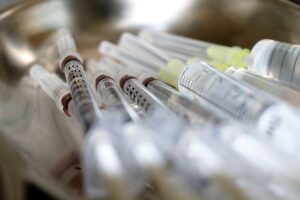-
National Covid-19 Vaccination Roadmap and Implementation Plan approved by Inter-Agency Task Force for the Management of Emerging Infectious Diseases
-
Procurement Service and Task Group Resource Management & Logistics to handle production, shipment, storage, distribution and deployment of COVID-19 vaccine across the Philippines
-
Vaccine czar Carlito Galvez, Jr. tasked to enter into vaccine distribution agreement with third-party warehouse, logistics provider
-
PH has no cold chain facility for vaccines with temp requirement of -70 degrees Celsius, said Health Secretary Francisco Duque III
 The Procurement Service (PS) and Task Group Resource Management & Logistics (TGRML) will handle the production, shipment, storage, distribution and deployment of the COVID-19 vaccine across the Philippines should it become available.
The Procurement Service (PS) and Task Group Resource Management & Logistics (TGRML) will handle the production, shipment, storage, distribution and deployment of the COVID-19 vaccine across the Philippines should it become available.
This is based on the National Covid-19 Vaccination Roadmap and Implementation Plan approved by the Inter-Agency Task Force for the Management of Emerging Infectious Diseases (IATF) through Resolution No. 83 dated November 5.
The roadmap has seven stages of implementation once a COVID-19 vaccine becomes available:
• Scientific evaluation and selection
• Access and acquisition
• Procurement process and financing
• Production, shipment and storage
• Distribution and deployment
• Implementation and nationwide vaccination
• Assessment, evaluation and monitoring
IATF Resolution 83 also grants National Task Force (NTF) Against COVID-19 chief implementer and vaccine czar Carlito Galvez, Jr. the right to enter into an agreement with a third-party warehouse and logistics provider, as necessary, on the supply and distribution of COVID-19 vaccines in the country.
His duties include establishing information and technology infrastructure to capture supply chain information as well as the distribution system for the COVID-19 vaccine.
Presidential spokesperson Harry Roque, Jr. earlier said considerations for the vaccine roadmap include safety, efficacy, sensitivity, and cost and complexities of the supply chain requirements. Other considerations include access to clinical trials and regions/local production and distribution, complexities on the ground preparation and implementation, and world supply and demand for vaccines.
Implementation schedule
Roque said the timetable for implementation must be completed and approved from November to December 2020 and the procurement process is expected to be completed from January-March 2021.
The Philippine government is currently coordinating with various embassies for government-to-government multilateral agreements on access to the supply of COVID-19 vaccines. The Philippines is also participating in the Global Alliance for Vaccines and Immunization COVAX Facility, a ground-breaking collaboration among countries that was initiated by the World Health Organization to accelerate the development, production, and equitable access to COVID-19 vaccine.
Galvez earlier said the Philippine government targets the procurement of 50 million doses of COVID-19 vaccines by 2021.
The government is currently in talks with various companies that have offered 17 different vaccines for scrutiny by the Department of Health (DOH), Department of Science and Technology, and the Vaccine Expert Panel, Galvez said.
Among these companies are United Kingdom-based Astra-Zeneca and American companies Pfizer, Moderna, and Novavax, he said.
Pfizer recently announced that the vaccine candidate it has jointly developed with BioNTech SE is more than 90% effective based on initial results of its Phase 3 clinical trials.
Philippine Ambassador to the United States Jose Manuel Romualdez earlier assured that Pfizer will ensure the Philippines is supplied with its COVID-19 vaccine once it is approved for distribution. He noted, however, that the pharmaceutical company will be prioritizing the US.
He estimates that the Pfizer vaccine will be approved by the US Food and Drug Administration (FDA) within the year and by Philippine FDA by early next year.
No appropriate vaccine facility
However, the genetic material the vaccine is made from needs to be stored at temperatures of -70 degrees Celsius (-94 degrees Fahrenheit) or below.
This “is a hefty requirement” as the country currently does not have such a facility, Health Secretary Francisco Duque III told Reuters in an interview.
“The technology Pfizer is using is new technology. We don’t have experience with that, so risks can be high,” he said, adding that “we will have to wait and see for now.”
Cold Chain Association of the Philippines Inc. president Anthony Dizon earlier said the country’s cold chain industry does not have facilities with temperatures as low as -80 degrees Celsius “because there is no existing need for that capability.”
DOH earlier said it is eyeing setting up more cold storage facilities nationwide to ensure enough proper storage for COVID-19 vaccines when they become available in the Philippines.
DOH Undersecretary Maria Rosario Vergeire said the agency will be reaching out to various groups to expand their storage facilities in preparation for the delivery and receipt of the COVID-19 vaccines.
Cold storage facilities are used to ensure medicines maintain their effectiveness when rolled out for delivery.
Vergeire said the type of cold storage facility needed will still depend on the type of SARS-Cov 2 vaccine to be approved.
SARS-Cov 2 vaccines have varying cold storage requirements. Some will need to be stored in ultra-low temperature conditions of about -70 degrees while others will require the usual temperature used in cold storage facilities.
DOH is currently using the storage facility of the Research Institute for Tropical Medicine as the national vaccine storage facility.
First detected in Wuhan, China last December, SARS-Cov 2 is the virus that causes the COVID-19 disease. – Roumina Pablo





